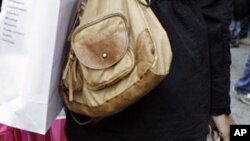The U.S. economy, the world's largest, grew at its fastest pace in a year-and-a-half in late 2011, but questions remain whether the advance will continue in coming months.
The U.S. government said Friday the country's national economic output increased 2.8 percent in the October-to-December period, a bit below the 3 percent estimate economists had projected. But the fourth quarter advance was the best of the year and the quickest pace since the April-to-June period in 2010.
For the year, the U.S. economy grew just 1.7 percent, after expanding 3 percent in 2010.
The government said the fourth quarter advance was boosted by companies rebuilding their inventories, and heightened consumer spending, which accounts for 70 percent of the national economy. But some of the spending came as Americans cut their savings rate.
While analysts said the American economy ended 2011 on a reasonably positive note, the advance could slow in the first months of 2012. With inventories rebuilt, businesses could ease their spending, and the U.S. is faced with a stalled economy throughout Europe, which could limit exports to one of its major trading partners.
The U.S. central bank, the Federal Reserve, this week forecast the country's 2012 economic growth at 2.2 to 2.7 percent, a slightly lower projection than it made just two months ago.
The U.S. economy has struggled to recover from the recession that extended from 2007 to 2009, advancing by some measurements, retreating in other ways.
The country's jobless rate, while still high by historical standards, declined to 8.5 percent in December, a figure that the nation's central bank says could edge lower in the coming months. About 200,000 jobs were added to the economy last month, but 13 million workers remain unemployed, with millions more having given up looking for work or employed in part-time jobs even as they seek full-time work.
The U.S. housing market is perhaps the weakest link in the national economy, with the fewest ever number of new homes sold in 2011, based on records dating back nearly a half century.
Central bank officials have often expressed disappointment that several policy shifts have failed to consistently boost the U.S. economy. The Federal Reserve this week said it would keep its benchmark interest near zero through late 2014, a year-and-a-half longer than previously announced, in a renewed effort to assure financial institutions that their borrowing costs will remain low for the next three years.
But the continued low rate also was an acknowledgement that the U.S. economy is still not advancing as fast as government leaders has hoped.
The national economy has become the key issue in the country's 2012 presidential race, as U.S. President Barack Obama, a Democrat, seeks a second four-year term. His two main Republican opponents - one-time venture capitalist Mitt Romney and former House of Representatives Speaker Newt Gingrich - have both staunchly criticized Mr. Obama's handling of the national economy as they vie for their party's nomination to oppose him in the national election in November.
Some information for this report was provided by AP and Reuters.




